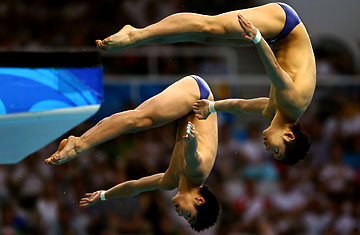
China's Lin Yue, right, and Huo Liang compete in Beijing's National Aquatics Center on August 11
When it comes to diving, the Chinese expect nothing less than perfection. On August 11, Chinese pair Lin Yue and Huo Liang triumphed in the men's synchronized 10m platform event, winning by a resounding 17.76 points. Silver went to the German squad, with the Russians — one of whom just recently recovered from a spinal injury — rounding out the medals count.
The Chinese led from the start. In the second of six dives, Lin and Huo racked up five perfect 10s in the synchronicity category. Impressive, but not quite as dominating as in the 2007 World Championships when the Chinese pair won gold by 22 points, an almost unheard of margin. The Chinese men's win came a day after their female compatriots, Guo Jingjing and Wu Minxia, nabbed gold in the synchronized 3m springboard event.
China's diving squad is used to ruling the board. Four years ago in Athens, the Chinese won six out of a possible eight diving golds, delivering more victories to their homeland than any other national squad. At this year's World Cup, the Chinese were even more commanding, capturing all but one of the eight golds on offer. (The sole miss came from the men's individual 10m platform event.)
But the domination has come at a price. In China's state-run sports system, coaches trawl the countryside looking for children with suitable physiques for every sport. Once kids enter elite athletic schools like these, they rarely see their parents and the extensive training often takes precedence over academics. Divers have to be recruited particularly early — sometimes as young as age six — before they develop a fear of heights and so that their bodies can be molded into the ultimate water-piercing missiles.
That early cultivation has ensured diving supremacy for the People's Republic. But the impact of thousands upon thousands of dives has left many Chinese divers with permanent eye injuries. After detaching a retina, Hu Jia, a Chinese gold medalist in Athens, told the Chinese press that he would nonetheless dedicate himself to striking gold in Beijing "unless my eyes are really blind." He ended up missing the 2008 Olympic squad because of injury.
Once divers enter the Chinese sports system, any perceived wavering in dedication to the sport can elicit heavy punishment. After winning gold in Athens, divers Guo Jingjing (who won a gold on August 10) and Tian Liang were publicly chastised for devoting time to commercial activities without prior approval from sports bureaucrats. Tian did not apologize for his alleged infraction. He was summarily expelled from the national team. Guo, however, made a tearful public mea culpa, saying, "I belong to the country."
China has rewarded Guo for her loyalty. The comely diver is China's most celebrated female Olympian, and that has translated into more, officially approved lucrative advertising contracts. (The Chinese state sports system makes sure to keep a chunk of her endorsement revenue.) On August 17th, Guo will defend her second Olympic gold, this time in the individual 3m springboard event.
For the victorious male pair on August 11, Huo and Lin, this is their first Olympics. But given the adulation with which Chinese fans shower the country's divers, there's little question that they, too, will soon be splashed across thousands of billboards.
